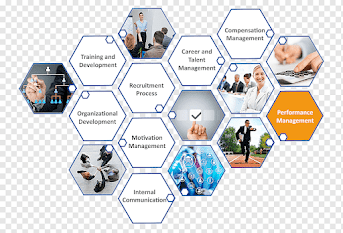Talent Management and Organizational Performances
Talent Management and Organizational Performances
Most businesses encounter significant talent management challenges. Due to a scarcity of talent, businesses all over the world compete for the same pool of people in order to keep their operations running and continue to grow in terms of service and profitability. For the organization's competitive advantage, talent is an instinctive trait possessed by a small number of persons with the capacity to have a significant impact on current and future company performance, and it is the appreciation of a personality's competence that must be discovered. In today's competitive business world, successful businesses have learnt that their ability to attract, develop, and retain the right talent is critical to their success. Anticipate and plan ahead to achieve the organization's objectives respond to talent shortages in a proactive manner (Pablos , 2004).
A set of methods and procedures for enhancing productivity by improving systems for attracting, developing, maintaining, and employing persons with the essential skills and aptitude to meet current and future company objectives is referred to as talent management. Talent management ensures that businesses have the right people in the right places to carry out their business plans. In practice, talent management refers to a set of methods for finding and managing individuals in order for a company's business strategy to flourish (Rodríguez & Escobar, 2010).
Importance of Talent Management
Talent management is critical when it comes to attracting and hiring future employees. Talented people are seen as strategic assets with the ability to create and acquire more value as they carry out corporate strategies. This can be viewed in a number of ways, including the ones listed below:
• Planning
• Attracting
• Selecting
• Developing
• Retaining
• Transitioning
 |
| Figure 1:TM process model (Ghosh, 2021) |
Relationship between Talent Management and Business Performance
Internal attributes that are difficult to mimic, rather than, say, the firm's product-market positions, are generally agreed upon by management researchers as providing a lasting competitive advantage. As a result, the resource and knowledge-based views, in particular, identify the firm's knowledge resources as a weapon for gaining long-term competitive advantage. Instead of leaving the task of staff development to individuals and their initiative, human resources see talent management as covering career development. Human resource management is responsible for building human capital and is placed within the office of the registrar of universities. Talent management benefits include lower hiring expenses, a well-negotiated wage structure, an efficient and effective, inspired and devoted staff, and better service delivery efficiency.As a result, the company will develop a new reputation as a rewarding place to work. As a result, new talent will be attracted, which is why talent management was adopted in the first place. Human resource management is an important field of study. The success or failure of any company, as well as its development or decline, is in great part determined by how well its people resources are managed. Talent management has undoubtedly remained under the scrutiny of organizational performance because it is the brain box of human capital management (Dahshan, et al., 2018). Talent Management and Organization Performance ModelThe talent management and organizational performance model recognizes and relates many aspects of talent management to workforce performance, which leads to organizational success.
|
 |
| Figure 2:Talent management framework (Optimis , 2011) |
he process of cultural change begins when a company improves its talent management and development. Once these behaviors and practices are entrenched inside the firm, your employees and executives will be expected to perform at their best.
References
Dahshan,
Keshk & Dorgham, 2018. Talent Management and Its Effect on Organization
Performance among Nurses at Shebin El-Kom Hospitals. International Journal
of Nursing, December, 5(2), pp. 109-111.
Available at: https://www.toolbox.com/hr/talent-management/articles/what-is-talent-management/
[Accessed 12 April 2022].
Ghosh, 2021.
Toolbox hr. [Online]
Jackson
& Schuler, 1990. Human resource planning: Challenges for
industrial/organizational psychologists. s.l.:American Psychologist.
Optimis ,
2011. Optimis Building your future, s.l.: Optimis HCM Sàrl.
Pablos ,
2004. Human resource management systems and their role in the development of
strategic resources: empirical evidence. Journal of European Industrial
Training, 01 August, 28(6), pp. 474-489.
Rodríguez
& Escobar, 2010. Talents: the Key for Successful Organizations. Kalmar:
Linnaeus University.




You have discussed an important aspect as talent management is essential to train and develop employees to higher levels within the organisation. It makes employees feel skilled and motivated and hence will reduce absenteeism and staff turnover. Good article. All the Best!
ReplyDeleteThank You Dilini
DeleteHi, I see talent management in an organization as very important. It is needed to increase performance within an organization. You have explained the importance of doing talent management properly and its importance. All the best!
ReplyDeleteThank You Tharindu
DeleteTalent management involves attracting and retaining high-quality employees, developing their skills, and continuously motivating them to improve their performance. Valuable article.
ReplyDeleteThank You Jude
DeleteAs explained, People must have talent in order to perform well in their roles. They make an immediate influence in organizational performance, and they have the potential to make a significant contribution in the future. The goal of talent management is to find, hire, retain, and develop talented people. Nice Article Asiri.
ReplyDelete